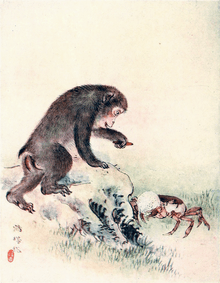
Crab, and teach it, as a profitable lesson, to their children.
Once upon a time there was a crab who lived in a marsh in a certain part of the country. It fell out one day that, the crab having picked up a rice cake, an ape, who had got a nasty hard persimmon-seed, came up, and begged the crab to make an exchange with him. The crab, who was a simple-minded creature, agreed to this proposal; and they each went their way, the ape chuckling to himself at the good bargain which he had made.
When the crab got home, he planted the persimmon-seed in his garden, and, as time slipped by, it sprouted, and by degrees grew to be a big tree. The crab watched the growth of his tree with great delight; but when the fruit ripened, and he was going to pluck it, the ape came in, and offered to gather it for him. The crab consenting, the ape climbed up into the tree, and began eating all the ripe fruit himself, while he only threw down the sour persimmons to the crab, inviting him, at the same time, to eat heartily. The crab, however, was not pleased at this arrangement, and thought that it was his turn to play a trick upon the ape; so he called out to him to come down head foremost. The ape did as he was bid; and as he crawled down, head foremost, the ripe fruit all came tumbling out of his pockets, and the crab, having picked up the persimmons, ran off and hid himself in a hole. The ape, seeing this, lay in ambush, and as soon as the crab crept out of his hiding-place gave him a sound drubbing, and went home. Just at this time a friendly egg and a bee, who were the apprentices of a certain rice-mortar, happened to pass that way, and, seeing the crab’s piteous condition, tied up his wounds, and, having escorted him home, began to lay plans to be revenged upon the cruel ape.
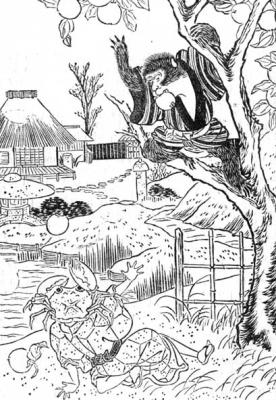
dreaming of the mischief that was brewing, returned home, and, having a fancy to drink a cup of tea, began lighting the fire in the hearth, when, all of a sudden, the egg, which was hidden in the ashes, burst with. the heat, and bespattered the frightened ape’s face, so that he fled, howling with pain, and crying, “Oh! what an unlucky beast I am!”
Maddened with the heat of the burst egg, he tried to go to the back of the house, when the bee darted out of a cupboard, and a piece of seaweed, who had joined the party, coming up at the same time, the ape was surrounded by enemies. In despair, he seized the clothes-rack, and fought valiantly for awhile; but he was no match for so many, and was obliged to run away, with the others in hot pursuit after him. Just as he was making his escape by a back door, however, the piece of seaweed tripped him up, and the rice-mortar, closing with him from behind, made an end of him.
So the crab, having punished his enemy, went home in triumph, and lived ever after on terms of brotherly love with the seaweed and the mortar. Was there ever such a fine piece of fun!
References
Freeman-Mitford, A.B., Tales of Old Japan, ,1871.
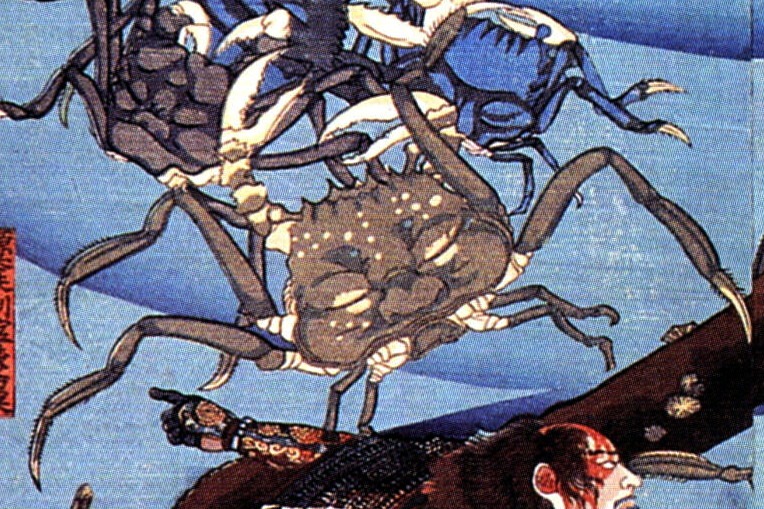
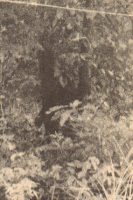
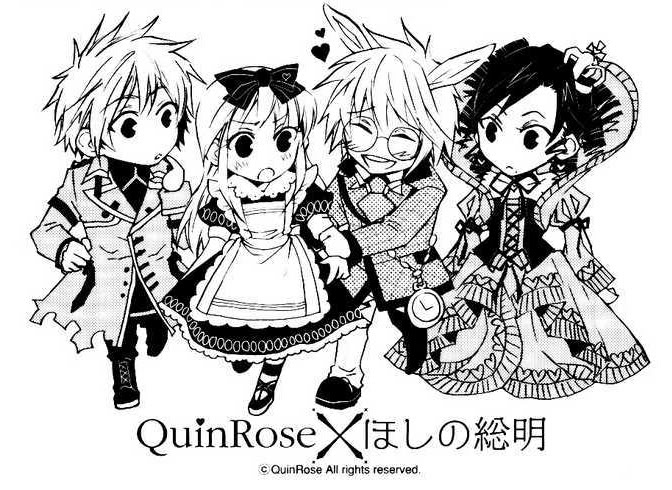
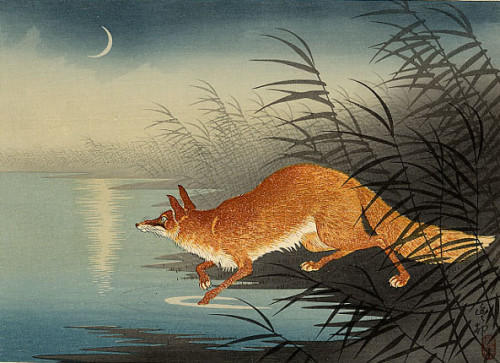
What is the message of the story
The message of the story is in the first sentence: “If a man thinks only of his own profit, and tries to benefit himself at the expense of others, he will incur the hatred of Heaven.” Basically, don’t be selfish is the moral lesson.